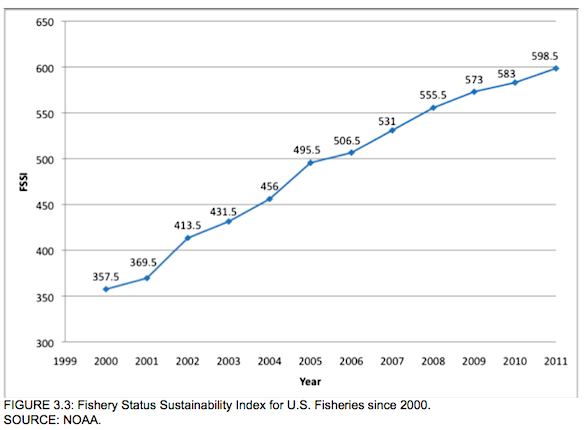 The U.S. National Ocean and Atmospheric Administration Fish Stock Sustainability Index (FSSI), which tracks 227 fish stocks that account for 90 percent of the total U.S. catch, shows continuous improvement in this graph from the September 2013 National Research Council (NRC) report, “Evaluating the Effectiveness of Fish Stock Rebuilding Plans in the United States.”
The U.S. National Ocean and Atmospheric Administration Fish Stock Sustainability Index (FSSI), which tracks 227 fish stocks that account for 90 percent of the total U.S. catch, shows continuous improvement in this graph from the September 2013 National Research Council (NRC) report, “Evaluating the Effectiveness of Fish Stock Rebuilding Plans in the United States.”
The most recent FSSI quarterly update shows the index up again at 613.5 and describes the scoring methodology (pdf).
The news is celebrated in the NRC press release: “Many, But Not All, Depleted Fish Populations Show Signs of Recovery Under Rebuilding Plans That Reduce Fish Harvest.”
The NRC report also summarizes recent research. “Scientific understanding of [marine] ecosystem dynamics is advancing rapidly.”
Pieces that caught my eye:
- “There is growing evidence of nonlinear dynamics in fish populations (Dixon et. al., 1999; Glaser et al., 2011), as well as a growing consensus that ecosystem and multi-species effects are important.”
- “Regime shifts in marine fish stocks appear to be quite common (Vert Pre et al., 2013).”
- “While it is common to attribute population declines exclusively to fishing or exclusively to the environment, in most cases, the observed stock dynamics are probably a combination of fishing and the environment. Furthermore, fishing and environmental effects may interact in ways that are non-additive (Hsieh et al., 2008; Deyle et al., 2013).”
- “Truncating the age structure may reduce the ability of populations to cope with sequences of poor conditions. A possible consequence of fishing-induced change in age structure may be an increased coupling between recruitment and environmental conditions.”
- “When fish stocks are depleted, their prey species are consumed by other predators that may increase in abundance, thereby limiting availability of the common prey. It may then be difficult to simultaneously rebuild all overfished species to their single-species BMSY levels without reductions in other consumer species.”
- “[I]n most cases, scientific understanding of ecosystem dynamics is insufficient to confidently predict the future state or to achieve desired tradeoffs among species (even if there were agreement on which tradeoffs are desirable). These cases depend on having pragmatic, operational management strategies that acknowledge this kind of uncertainty.”

